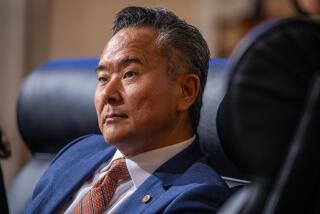Free the ‘Keating Five’? : Inouye had a point--and why the answer is public campaign financing
- Share via
The Senate Ethics Committee may or may not conclude that California’s Alan Cranston and others among the so-called “Keating Five” violated their chamber’s standards of conduct when they intervened with federal regulators on behalf of Lincoln Savings & Loan’s former owner. But whatever the committee’s decision, the testimony it has taken paints an intolerably squalid picture of business-as-usual in “the world’s greatest deliberative body.”
It is, moreover, a squalor that will persist and deepen until the United States comes to grips not only with the acts alleged in this instance, but also with the way in which money is raised and spent in political campaigns.
Cranston’s case most clearly illustrates the point: Charles H. Keating Jr., the former thrift executive who now is an accused swindler, gave Cranston $60,000 in direct campaign contributions, $85,000 for the California Democratic Party and $850,000 to support the activities of a voter registration group run by the senator’s son, Kim. According to memorandums written by Cranston fund-raiser Joy Jacobson, some of that money was solicited during conversations in which the senator also promised to press Keating’s cause with regulators investigating his spectacular mismanagement of Lincoln Savings. Failure to bring that 3-year probe to a timely conclusion ultimately saddled the American people with $2 billion in utterly unrecoverable costs from the thrift’s failure.
Cranston’s critics charge that his conduct breached a 38-year-old Senate standard requiring that campaign contributions not be solicited at the same time a favor is being done for the prospective donor. “Furthermore,” wrote the standard’s author, then-Sen. Paul Douglas, “a decent interval of time should be allowed to lapse so that neither party will feel that there is a close connection between the two acts.”
Neither, presumably, will the people--which is why the Douglas standard better describes a public relations campaign than it does a code of ethics.
During the course of this whole bleak affair, there has been no more melancholy sight than that of the distinguished senior senator from Hawaii, Daniel K. Inouye, testifying as a character witness for the five accused lawmakers. They had, Inouye said, done nothing that other senators do not routinely do. “I believe that what is on trial here are not the five colleagues of mine, but the United States Senate and, for that matter, the Congress of the United States,” Inouye said.
That was an honest, if not particularly edifying, admission. It describes a situation that will continue until the United States enacts a system of campaign spending limits and public campaign financing of the sort already adopted by progressive cities like Los Angeles.
More to Read
Get the L.A. Times Politics newsletter
Deeply reported insights into legislation, politics and policy from Sacramento, Washington and beyond. In your inbox twice per week.
You may occasionally receive promotional content from the Los Angeles Times.









